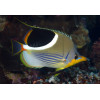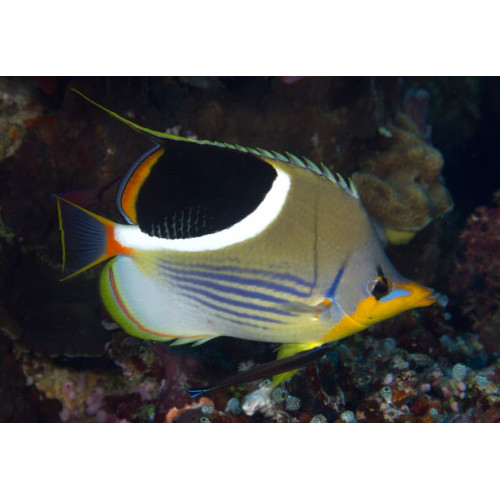Species Name : Chaetodon Ephippium
Care Level : Moderate
Temperament : Semi-aggressive
Color : Black, Blue, Orange, White
Diet : Omnivore
Reef Compatible : No
Water Conditions : sg 1.020-1.025, 72-78° F, dKH 8-12, pH 8.1-8.4
Max. Size : 9"
Origin : Indo-Pacific
Family : Chaetodontidae
Minimum Tank Size : 125 gallons
The Saddle Butterflyfish (Chaetodon Ephippium) is a species of marine ray-finned fish, a butterflyfish belonging to the family Chaetodontidae.
Its body has the typical butterflyfish disc shape compressed laterally. The base color is gray with several blue-gray stripes on the lower body. Orange coloration is found on the lower half of its face as well as outlining the black tail. The Saddlefish Butterfly has a large black "saddle" with a white border on the posterior upper corner of the body and dorsal fin. But it has a more pronounced snout than most species, giving it a rather ornamental aspect. The dorsal fins are jagged and can get caught in nets. This butterfly will grow to be about 9" in size and will need ample swimming space.
The Saddleback Butterflyfish will do best in a 125 gallon or larger aquarium with plenty of swimming space and well-maintained water quality. A large, mature system is requisite, along with ample live rock for the fish to browse upon/hide amongst and a large open swimming space along the front of the aquarium. The Saddleback Butterfly is fairly hardy and adapts well to life in an aquarium if acclimated properly.
Saddleback Butterflyfish are not reef safe and may eat most stony corals, a few soft corals, and invertebrates that inhabit any live rock. They won't do well with fish that are overly aggressive, but they will also nip and pick at fish that are very timid. Unlike other butterflies, the Saddlebacks cannot be added to an aquarium in a group. Keep only one Saddleback Butterflyfish per tank (unless a mated pair is acquired) and not with any other butterflyfish as they will squabble over territories.
This species has not been bred in captivity. In the wild, these fish form distinct pairs and scatter their eggs in open water.
Its diet should include a variety of meaty preparations. Diet should include a variety of mysis and vitamin enriched brine shrimp, spirulina, nori, seaweed, marine algae, and algae based foods, 2-3 times daily.
-
There are no reviews for this product.
-
No questions yet


